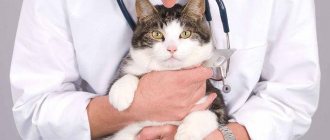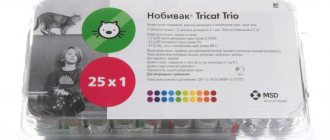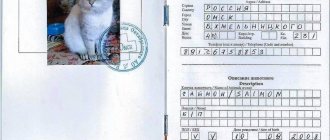According to veterinary standards, vaccination of a cat after deworming can only be done after a break. The precaution is necessary to ensure the absence of parasites and to reduce the burden on the pet's immune defenses. The exact timing of when vaccination can be carried out is determined by the veterinarian. Failure to comply with the instructions is dangerous to the life and health of the cat.
Is it necessary to worm a cat before vaccination?
Whether it is necessary to worm a cat before vaccination is a very controversial question, since if the pet is clean, there is no need to do this.
Anthelmintic drugs should be given before vaccination.
Anti-parasite medications are most often given to animals for preventive purposes. However, if vaccination is planned, and your pet is found to have worms, it is necessary to deworm it in advance.
The doctor will refuse to vaccinate the owner if the parasites are not removed from the cat’s body. What exactly is the reason? The fact is that parasites weaken the animal’s body. Accordingly, the vaccine introduced during this period will not help, but, on the contrary, will worsen the pet’s condition. It is for this reason that it is necessary to worm the cat in advance.
To deworm or not?
If the kitten is still small or the adult animal does not undergo scheduled deworming within a year, then a coprogram (general stool analysis) should be done.
The study will confirm or deny the presence of parasites in the cat’s body, and will also help to recognize which helminths live in the cat. Based on the results obtained, the veterinarian will be able to choose the right drug to treat the pet and draw up a detailed plan for the procedures.
The owner is fully responsible for the health of his pet, because the cat will not say that it feels bad, will not complain about stomach pain or loss of appetite. If you strictly follow the schedule and rules for deworming and vaccination, your furry friend will always be healthy and cheerful.
When to worm a cat before vaccination
How to give a cat deworming tablet and how often to give it
How many days before vaccination should I give my cat anthelmintic? According to the established rules, you will need to give the anti-parasite pill twice. The first time this is done 2-3 weeks before the injection is given. The second procedure will need to be carried out after vaccination in 10-14 days.
For your information! The bottom line is that it is necessary to destroy not only adult helminths, but also the subsequently hatching larvae. Parasite eggs can remain in the pet’s body for some time.
Choice of drug
7 days before starting treatment for parasites, according to veterinary standards, you need to undergo drug therapy to kill fleas. This rule is especially important for outdoor cats.
Veterinarians recommend using anti-worm medications presented in the table:
| Drug name | Release form |
| "Parasicide" | Oral suspension |
| "Dirofen" | |
| "Parasite" | |
| "Pirantel" | |
| "Drontal" | Pills |
| "Cestal" | |
| "Milbemax" | |
| "Fenbendazole" | Powder |
| "Ivermectin" | Injections |
| "Dectomax" |
Various forms of medications give a similar effect, so owners should focus on the criterion of convenience for the pet. The tablets can be crushed if the cat cannot swallow them whole and mixed into food. The suspension must be carefully injected into the animal's mouth using a syringe without a needle. Placing injections at the drawn withers does not require special skills, however, it is important to first disinfect the area with alcohol or hydrogen peroxide. The injection is painless for the animal. To completely remove parasites and improve the functioning of the gastrointestinal tract, you should introduce foods rich in fiber - vegetables and fruits - into your cat's diet. Before vaccination, you need to bring your pet to the clinic for an additional examination.
How to prepare a cat for vaccination
Having found out how many days after deworming a cat can be vaccinated, you should also understand how the animal prepares for vaccination. It also matters what type of vaccination will be given.
How many days does a cat walk: examples for the first time and how long in time
Veterinarians most often ask owners to adhere to the following rules before vaccinating:
- if vaccination is carried out only once, taking medications against worms should end no later than a week before the injection;
- when it is planned to vaccinate against several types of diseases at once, the cat’s body should be cleansed at least 2-3 weeks in advance, depending on the type of tablets that are given to the pet;
- You can vaccinate against rabies only a month after the cat has been dewormed;
- if it is necessary to re-vaccinate against several types of diseases, cleansing is carried out 21 days before the injection.
Important! How you can understand how long before vaccination you need to worm a cat depends on the specific case. Therefore, when you bring your pet for an examination, you should discuss this issue with your veterinarian in advance.
Preparing the cat for the procedure
Quarantine after rabies vaccination in dogs
The dog should be closely monitored after vaccination. With the help of the administered drug, the dog develops immunity to the disease. The dog owner must take this period of time seriously and monitor the animal.
At that time:
- - you cannot move to another place of residence (even to the country);
- - walks must be carried out strictly on a leash;
- — do not allow your dog to interact with stray dogs;
- - do not wash the dog;
- - avoid serious physical activity;
- — provide balanced, high-quality nutrition;
- - Do not give the dog any new foods.
IMPORTANT! The quarantine period for adult dogs that have previously been vaccinated is 2 weeks. The quarantine period for puppies undergoing this procedure for the first time is 3 weeks.
How to properly deworm cats and kittens
First of all, the deworming procedure should begin with the destruction of external parasites, that is, fleas. They are carriers and can add additional problems to the animal.
When kittens open their eyes: how many days after birth
Both adults and kittens can be dewormed only if they are healthy. A sick animal cannot be cleared of parasites until it has fully recovered.
Note! It is very important to follow the dosage, especially when the issue concerns children. It is best to ask your doctor about the type of drug that will suit your particular animal. Not every substance is suitable for both adults and kittens.
Most medications are given to the pet in the morning and on an empty stomach, that is, before the pet has breakfast.
Contraindications for worming
Anti-worm medications are toxic substances, so they must be given strictly according to the instructions. In addition, there are some contraindications for which deworming is not recommended. You should refuse the procedure in the following cases:
- sick, weak, exhausted animal;
- postoperative period;
- puppies under 2 weeks of age;
- the presence of external parasites in the dog - fleas, ticks, etc.
Important! Anthelmintic drugs should be given with caution to pregnant and lactating females, those with chronic diseases, as well as pets with a tendency to allergic reactions.
In case of serious infestation with worms, medications are administered by injection.
Is it necessary to worm again after 10-14 days?
If the cat has already been vaccinated after deworming, and no further vaccination is planned, the question arises: is it necessary to re-give the medicine to the cat? As already mentioned, after 10-14 days the cats are given anthelmintic again to destroy any larvae that may have remained in the body.
However, this issue should be approached with caution. First of all, you should carefully observe your pet. If after the injection he feels well: eats, drinks, plays, additional cleansing will not harm him. If your pet is experiencing any health problems, such as vomiting, diarrhea, or other symptoms, you should consult with a veterinarian before reintroducing medications.
Purpose of the procedure
Animals, like people, are susceptible to viral infections.
Preventive measures, one of which is vaccination, help to avoid the disease or reduce its severity. Puppies begin to be vaccinated from the second month of their birth, and then follow a certain schedule. This will allow you in the future, without risking your pet’s health, to take your dog out into the wild or take it hunting with you.
Unvaccinated animals are not allowed to participate in exhibitions and are not allowed to be transported on public transport.
How do worms affect the immune system?
Once in the gastrointestinal tract, worms “travel” throughout the body:
they parasitize muscles and tissues;- penetrate into blood vessels;
- undergo a certain stage of development in the dog’s lungs;
- live in almost all organs.
Helminths harm the entire body, regardless of where they are located (lungs, stomach, intestines).
Worms receive nutrition from animal tissues, poisoning the body with waste from their vital activity. As a result, the dog's immunity weakens. This makes the pet weakly resistant to infections.
Parasites are especially dangerous for puppies: they can lead to intestinal rupture and injury to other organs, causing severe intoxication of the baby’s body.
Helminths and vaccination
A vaccine is a biomaterial containing viruses, upon administration of which the body begins to produce antibodies.
Vaccination prepares the immune system to fight infections. But in order for the body to develop a protective reaction, it needs strength.
Helminths that have settled in a dog deprive it of energy resources. Therefore, the body is not able to cope with two problems at once - the parasites that have settled inside and the viruses introduced by the vaccine.
To prevent a breakthrough in post-vaccination immunity, which leads to a serious illness in the pet, it is necessary to eliminate the harmful factor. This is the main purpose of deworming.
Anthelmintics for cats before vaccination
Medicines intended to deworm cats are available in the form of tablets, suspensions, solutions for giving injections or drops on the withers, and there are also sugar cubes.
Important! Under no circumstances should medications intended for human use be given, even in small quantities. The cat’s body may simply not accept such substances, which will lead to great harm to the pet.
List of the most popular tablets prescribed to cats:
- azinox. The active substance is praziquantel;
- febtal. Active ingredient fenbendazole;
- Alben C;
- Caniverm;
- dronzite.
If your cat has a negative reaction to taking the tablets, a suspension may be used as an alternative. The most popular medications:
- prazicide;
- prazitel;
- Ddirofen.
For your information! The active ingredients in all medications are praziquantel and pyrantel pamoate. The only difference is the dosages used.
The use of drops on the withers is allowed only if taking the medicine orally is simply impossible. The most suitable substances for this are Profender and Stronghold. Both of these drugs have a complex effect and are designed to kill both fleas and worms. The substance is often applied to the area of the shoulder blades so that the cat cannot lick it off.
Another alternative is sugar cubes. Polyvercan is intended for oral administration, and cats readily lick them off. It is also possible to give an injection, but this will require certain skills from the owner.
Popular remedies for parasites
Important! Small kittens should not be given the same medications as an adult pet. In this case, a special anthelmintic type of medicine with a lower content of active substances is used.
Why do you need to do anthelmintic treatment before vaccination?
A vaccine is purified and weakened viruses that, in an active state, cause disease, but in such a “half-dead” state they are not capable of causing harm. At the same time, they have the entire set of characteristics inherent to their species. The immune system, seeing foreign bodies, throws all its energy into neutralizing them and... easily defeats the deactivated pathogen. Specific memory cells are formed in the body, which immediately provide information about methods of combating pathogenic microorganisms in the event of re-infection. Unfortunately, immune memory is short-lived, so vaccinations should be done regularly.
And worms are parasites. They literally “eat” their owner, absorbing nutrients, vitamins and minerals from the food he eats and even from the blood and lymph. Helminths damage the intestinal mucosa, attaching to it with suction cups, disrupting the balance of microflora and, releasing metabolic toxins, causing intoxication and destructive processes in internal organs. In addition, the larvae of some worms can migrate from the intestine through the blood vessels to other organs, such as the lungs, uterus or liver.
The body perceives helminths as antigens and secretes antibodies to destroy them. If you do not give anthelmintic for dogs before vaccination, the immune system may not cope with two “enemies” at once and vaccination will either be ineffective or lead to the disease from which it was supposed to save (distemper, adenovirus infection, parainfluenza, parvovirus enteritis, leptospirosis or rabies ).
Deworming with folk remedies
The use of traditional methods of deworming is most often justified by causing less harm to the pet’s body. This is especially true during pregnancy or breastfeeding. There are quite a lot of folk recipes against worms:
- decoction of chamomile and fennel. Dry grass is poured with boiling water and infused for 20-30 minutes. The decoction is added to the drinking bowl or poured into the animal’s mouth once a day for a week;
- onion decoction. Fresh onions are poured with boiling water and left for 20-30 minutes, and then filtered. The cat is given the decoction in the morning on an empty stomach for a week;
- alcohol tincture of wormwood is sold in pharmacies. Give 5-10 drops in the evening before meals. Course - 1 week;
- freshly squeezed carrot juice 10-20 ml every day for a week;
- fresh garlic. 1 slice is added to the food. Course - 1 week.
Note! Such treatment options are only partly safe. Decoctions and juices cannot cause intoxication, but can cause an allergic reaction or stomach upset.
Garlic for worms - an old-fashioned method
Side effects of the rabies vaccine
After the rabies vaccination, you should stay at the veterinary clinic for another 20-25 minutes. If the dog does not show any changes, you can go home.
NOTE! In the first half hour after the vaccine is administered, an allergic reaction may begin to develop and even anaphylactic shock may occur, so it is better to remain under the supervision of specialists at this time.
In addition, some symptoms may appear in the first days after vaccination. In the case of a high-quality vaccine and the absolute health of the dog, the vaccination should not be accompanied by any serious manifestations.
Acceptable symptoms include:
- - slight increase in body temperature (maximum 0.5 degrees);
- - the appearance of a lump at the site of vaccine administration - it should not hurt;
- - lack of appetite for a maximum of one day;
- - isolated cases of diarrhea or vomiting;
- - lethargy of the dog - can also last a maximum of a day after administration of the drug.
If your dog develops additional symptoms such as restlessness, whining, severe pain, convulsions, or drooling, you need to take your dog to the veterinarian.
How to evaluate the effectiveness of an anthelmintic procedure
You can evaluate the effectiveness of the procedure and understand that the pet actually ate the drug and did not spit it out after 1-3 days (depending on the type of medication). As a rule, if the cleansing is successful, then fragments of dead parasites can be seen in the animal’s feces. However, if this does not happen, you should not re-administer the drug to avoid an overdose.
In most cases, deworming for a cat goes unnoticed. Rare exceptions such as loss of appetite or changes in stool are attributed to a side effect of the medication.
Important! Sorbents reduce the effectiveness of anthelmintic drugs, so it is not recommended to give them during the cleansing period.
How to clean a dog of worms: review of drugs + prices
Pharmacological veterinary companies produce many anti-worm products. They differ in composition, action, price and safety. Below are the best drugs with minimal side effects.
List of effective remedies
Animals from two months and older can use any anthelmintic: this is the age at which most drugs are suitable. The main thing is to follow the dosage by weight.
The best way to worm an adult dog at home (prices are approximate):
- Drontal Plus.
Tablets with meat flavor. Available in 2 dosages - 10 kg (300 rubles) and 35 kg (600 rubles). Helps against round and tape worms, lamblia. Rarely cause negative reactions. - Milbemax.
Delicious chewable capsules with chicken flavor. The main advantage is the abundance of dosages for puppies and dogs of different weights. The medicine contains milbemycin, therefore it is prohibited for collies and related breeds. Price – 650-1,000 rubles depending on the form of release. - Alben S.
One of the best and inexpensive drugs - a package of 6 tablets costs about 150 rubles. But giving the medicine is inconvenient: each capsule is designed for 5 kg, so you have to combine several tablets for dogs with larger weights. - Pratel.
A cheap and popular remedy - it is sold for 50-60 rubles per tablet. However, it only works on roundworms and tapeworms and does not help against flat nematodes. Puppies under 1.5 months are prohibited. - Advocate.
Drops on the withers with complex action. They help not only against helminths, but also against ectoparasites. However, they only lead to the death of round nematodes. The product is produced in dosages by weight: up to 4 kg, 4-10 kg, 10-25 kg and 25-40 kg. Cost – 350-650 rubles per pipette, depending on the form of release. - Inspector Total S.
Another drops on the withers of complex action. Available in the same dosages as Advocate. The effect of the two drugs is similar, but the Inspector additionally kills ixodid ticks. They sell for 350-700 rubles. - Polyverkan.
Good medicine in the form of sugar cubes. Animals eat them with pleasure, and if not, the briquettes can be easily dissolved in water and poured into the mouth from a syringe. They sell individually for 70-80 rubles.
Anthelmintics for puppies up to 1-2 months
Choosing what to worm a puppy at 1 month or earlier is not easy. There are few products produced, and those that exist do not always work, as they contain minimal dosages of active substances.
The following drugs get rid of helminths and do not cause side effects in kittens:
- Drontal Junior.
Sweet syrup is suitable for puppies from 2 weeks. It kills worms in a couple of days without causing negative reactions. Give a solution at the rate of 1 ml per 1 kg of weight. Costs on average 650 rubles per 50 ml bottle. - Prazicide solution.
A universal product that is suitable for puppies from 3 weeks. There are 2 forms: for pets of medium and large breeds (they give 1 ml per 3 kg), and also for small ones (1 ml per 1 kg). Price – 150 rubles. - Dehinel Plus.
A good medicine for large breed puppies - the minimum dosage is calculated for 10 kg of weight. Non-toxic, adverse reactions occur only in animals hypersensitive to febantel, praziquantel or pyrantel. Can be used from 3 weeks. Sells from 180 rubles. - Procox.
A good drug in the form of a suspension, it helps against round nematodes and coccidia. Used for puppies from 2 weeks at the rate of 1 ml per 2 kg. The minimum cost is 500 rubles.
Breeds for which not all medications are suitable
Some breeds do not tolerate ivermectin and emodepside, toxins that have nematocidal effects. These drugs lead to allergies, tremors, paresis and even death.
Special breeds include:
- collie;
- Sheltie;
- Australian Shepherd;
- bobtail;
- whippet;
- silky windhound.
Therefore, if your pet is a breed from the list, before purchasing an anthelmintic, make sure that it does not contain these substances.
When deworming is contraindicated
Experts prohibit giving cats medications against parasites in the following cases:
- there is an acute allergic reaction;
- the cat is pregnant;
- urolithiasis was diagnosed;
- the cat is significantly underweight;
- there is a viral disease or infection;
- The kitten is less than 2 months old.
Small kittens should not be wormed
Having considered the features of the anthelmintic procedure, we can draw conclusions. First of all, owners should remember that if parasites are present, the procedure is mandatory before vaccination. It is also very important to choose the right drug and follow the dosage. If difficulties arise, it is best to consult a specialist.
Symptoms of worms in a cat
It is almost impossible to determine independently, “by eye,” whether an animal is infected or not, since the symptoms of parasite species are very different.
There are some common signs.
- change in the nature of appetite - decrease or increase;
- variable stool - diarrhea alternates with constipation;
- vomiting or retching, mucus or a small amount of blood may be detected;
- the presence of mucus, blood or helminth larvae in the feces;
- irritation and itching in the anal area (this manifests itself in “riding” on the butt);
- bloating that occurs periodically;
- lethargy and weakness;
- dullness of coat;
- allergic reactions (hair loss, falling on the ears, discharge from the eyes and nose, sneezing);
- if the cat is pregnant, a parasitic infection can cause premature birth and miscarriage;
- when one kitten from a litter is affected, there is a noticeable difference in development compared to the rest;
- weight loss (regardless of nutrition);
- with a strong spread of helminths in the body, paralysis of the limbs occurs.
If two or more signs of disease are detected, a veterinarian should be consulted. He will be able to identify the type of helminths and prescribe medications for treatment. But prevention is most important, especially before vaccination.
Is it necessary to undergo the procedure before the second vaccination?
The administration of an antiviral vaccine provides protection against the corresponding infection for a long period. There are certain schemes for grafting strains. Adult dogs are revaccinated annually, and deworming is required before each procedure.
Babies are vaccinated in stages - in 2 doses. If the preliminary removal of worms followed all the rules, one procedure is enough.
The second vaccination is performed after 3-4 weeks, and this fits within the one and a half month interval of action of the drug against worms.
If a puppy was brought from the street and his body is simply “teeming” with parasites, then the first deworming will only partially remove the worms. Therefore, an additional procedure may be necessary before the next vaccination, but this should be decided by the supervising doctor.
How to properly administer medications to adult animals
Deworming before vaccination of cats is carried out only in cases where the animal is healthy. Pregnancy should be excluded: the anthelmintic may lead to the birth of dead or sick babies. The cat should not be exhausted or weakened by a recent illness. You should not worm your pet if it was last wormed less than a month ago: using the drugs too frequently is harmful to health.
If the animal eats dry food, does not leave the house, the cat has been properly cared for, and the owner is confident that there is no parasite infection, the product can be given once 2 weeks before the vaccine is administered.
An animal that walks outside and eats natural products should be given the drug twice to exclude the possibility of parasites. If there is severe infestation, a third pass may be necessary.
After taking the drug, the cat must have a bowel movement within 24 hours. If this does not happen, intoxication of the body is possible. To facilitate the removal of feces, you can give your cat a drop of Vaseline oil. It is prohibited to give other oils, as they negatively affect the condition of the cat’s liver.
It is necessary to follow the regimen of taking anthelmintic drugs not only during the initial administration of the vaccine, but also during revaccination.
Failure to comply with the deadlines may lead to a decrease in the effectiveness of the anthelmintic drug and vaccine. If the drugs are incompatible, unwanted reactions may occur.










